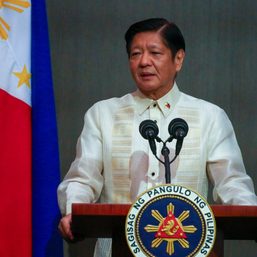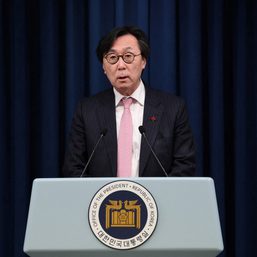SUMMARY
This is AI generated summarization, which may have errors. For context, always refer to the full article.
![[Just Saying] Invoke the Mutual Defense Treaty](https://www.rappler.com/tachyon/2024/06/TL-invoke-mutual-defense-treaty-June-25-2024.jpg)
Apparently alluding to the Ayungin shoal incident where China Coast Guard personnel attacked Filipino soldiers with knives and clubs to prevent them from delivering supplies, President Ferdinand Marcos Jr. recently said: “We are not in the business to instigate wars.”
Unfortunately, such statement – sounding so cliché – does not rise to the level of a declaration exuding national consternation. If at all, it was a hackneyed retort that did not produce the sense of illegality that the incident truly exhibited.
What happened in the Ayungin Shoal was an unmistakable manifestation of the intrusive policy of China within Philippine territory. One cannot interpret it in any other way. Let us remember that China has been violating our territorial sovereignty long before this recent intrusion.
In this regard, it was totally inappropriate for Philippine authorities to categorize the incident as not amounting to an armed attack, diminishing the nature of China’s illegal moves. Fortunately, Defense Secretary Gilberto Teodoro made a clarification, stating that “we see the latest incident in Ayungin not as a misunderstanding or an accident. It is a deliberate act of the Chinese officialdom to prevent us from completing our mission.”
But a more serious response is still needed.
Invoke Article 3
This must take the form of calling into operation the first part of the 1951 Philippines-United States Mutual Defense Treaty provided in Article 3. It states that both countries, “through their Foreign Ministers or their deputies, will consult together from time to time regarding the implementation of this Treaty and whenever in the opinion of either of them the territorial integrity, political independence or security of either of the Parties is threatened by external armed attack in the Pacific.”
The Ayungin incident is one of those times. It involves China’s total disregard of our territorial rights and security. In essence, there was an actual, if not threatened, “external armed attack in the Pacific.” Although the Ayungin Shoal is in the South China Sea, the problematic issues around it undeniably affect the “fabric of peace in the Pacific area” and its regional security, as referred to in the very first reaffirmation and fourth declaration spelled out in the treaty itself.
More importantly, the Philippine foreign affairs and defense departments, respectively, must know – if they do not yet know – that the United States interprets “armed attack” to justify self-defense under Article 51 of the United Nations Charter as not merely including the actual use of force but also the imminency of an armed attack. This has also been adopted by many states to precisely prevent the “sitting duck” situation where a country is ravaged first before responding.
Antiquated view
It is quite revealing how some of our military personnel or military advisers still view the concept of an armed attack as merely limited to the use of actual force. Their notion is so antiquated. They have to truly catch up on the emerging concepts and paradigms in international law positing that imminency of an attack arguably may already be within the penumbra of an “armed attack.”
At this time, when weapons of mass destruction can annihilate entire cities without making a beachhead on the besieged country, the concept of “armed attack” can no longer be limited to the Caroline doctrine that states that self-defense or anticipatory self-defense is narrowed down only to an attack that is “instant, overwhelming, and leaving no choice of means and no moment for deliberation.”
Given the aggressive stance and strategic deployment of Chinese military assets, there is thus no doubt that a call for an Article-3-consultation is warranted. It is time for the US and the Philippines to assess the situation and devise a unified, firm and calibrated response, short of war or a preparation for war, in accordance with the United Nations Charter.
It can even take the form of a unified statement of alarm and caution. Its sole purpose as of the moment is, as enunciated in the Mutual Defense Treaty, to put China continually on notice that “no potential aggressor could be under the illusion that either of them (Philippines and the US) stands alone in the Pacific Area.” This can even be backed up by the unilateral binding statement of President Joe Biden that the US’s support for the Philippines is iron-clad.
Many lessons should have been learned by the administration through this Ayungin incident. Flip-flopping on a particular stance is a sign of an incoherent brand of governance and leadership.
Non-focused and cliched statement to describe the government’s policy leads to no impact at all both nationally and internationally. An in-depth knowledge of the notion of self-defense, which includes discussions on anticipatory, preventive or preemptive self-defense (which may not involve a previous armed attack) must be learned by the administration, especially the military. Make great use of the country’s alliances.
Lastly, to our administration officials, there are times that you should know which side you truly belong. Do not readily provide apparent justifications for the actions of those already illegally intruding into our territory. – Rappler.com
Mel Sta Maria is former dean of the Far Eastern University (FEU) Institute of Law. He teaches law at FEU and the Ateneo School of Law, hosts shows on both radio and Youtube, and has authored several books on law, politics, and current events.
2 comments
How does this make you feel?







![[Rappler Investigates] When China, Leila, Sara conspire](https://www.rappler.com/tachyon/2024/06/saraduterte-west-ph-sea-leila-de-lima-newsletter-june-27-2024.jpg?resize=257%2C257&crop=279px%2C0px%2C720px%2C720px)


![[Newspoint] Willful indifference](https://www.rappler.com/tachyon/2024/05/np-willful-indifference-05032024.jpg?resize=257%2C257&crop=270px%2C0px%2C720px%2C720px)
![[ANALYSIS] High noon for Marcos](https://www.rappler.com/tachyon/2024/06/high-noon-for-marcos.jpg?resize=257%2C257&crop_strategy=attention)




![[Rappler’s Best] Divided we fall](https://www.rappler.com/tachyon/2024/06/Divided-we-fall.jpg?resize=257%2C257&crop=363px%2C0px%2C720px%2C720px)

![[EDITORIAL] Paano nangyari na naging mayor ang isa umanong Chinese asset?](https://www.rappler.com/tachyon/2024/05/animated-bamban-mayor-illegal-carousel-revised.jpg?resize=257%2C257&crop_strategy=attention)



![[ANALYSIS] The West Philippine Sea dispute and the stock market’s performance](https://www.rappler.com/tachyon/2024/06/thought-leaders-west-ph-sea-dispute-and-market-performance.jpg?resize=257%2C257&crop=134px%2C0px%2C720px%2C720px)






Invoking Article 3 is urgent.
I agree that our government should invoke Article 3 of the first part of the 1951 Philippines-United States Mutual Defense Treaty. But would President Marcos Jr. invoke it?